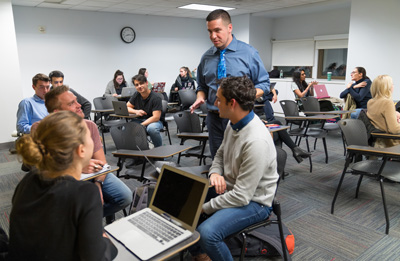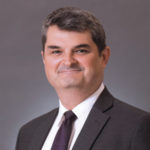2019 Launching a Career in International Affairs
THIS GUIDE IS NO LONGER ACTIVE. For the current FP Guide, click here.
New York University School of Professional Studies,
Center for Global Affairs
A second master’s degree program, new specialty concentrations, and expanded opportunities to work with real-world clients give students at the NYU School of Professional Studies (NYUSPS) Center for Global Affairs (CGA) more ways to hit the ground running once they enter the rapidly changing world of work.
 CGA is using a range of initiatives to prepare its students for careers in international relations, not only with a solid grounding in concepts and theory, but with practical experience tackling real-world problems, says Clinical Associate Professor Christopher Ankersen. He knows something about real-world problems, having worked for the United Nations in Thailand; in Phnom Penh, Cambodia; in Geneva; and in Vienna before joining NYUSPS.
CGA is using a range of initiatives to prepare its students for careers in international relations, not only with a solid grounding in concepts and theory, but with practical experience tackling real-world problems, says Clinical Associate Professor Christopher Ankersen. He knows something about real-world problems, having worked for the United Nations in Thailand; in Phnom Penh, Cambodia; in Geneva; and in Vienna before joining NYUSPS.
“Employers are looking for reliability—someone who can come in on day one fully prepared and not intimidated,” Ankersen asserts. “With the practical experience integrated into their course work, students come to realize that this isn’t like writing a paper or just stating the right answer in an essay. A lot of logistics, people management, and time management are not covered in a textbook, but they are essential.”
The new MS in Global Security, Conflict, and Cybercrime is the first degree introduced since CGA was established 15 years ago with its original MS in Global Affairs. The degree focuses on transnational security issues of cybercrime, cyberconflict, and cyberwarfare, with an emphasis on understanding the effects of—and possible solutions for—disinformation, espionage, and terrorists’ use of emerging technologies and media.

“Employers are looking for reliability—someone who can come in on day one fully prepared and not be intimidated.” –Christopher Ankersen, Clinical Associate Professor, NYUSPS Center for Global Affairs
CGA is also offering two new specializations within its current MS in Global Affairs: data analytics and United Nations studies. Students who complete one of these specializations will be able to provide employers with concrete evidence of their expertise in that area. The specializations can be combined with one of eight concentrations, including Global Gender Studies, International Law and Human Rights, Peacebuilding, and Transnational Security, among others.
CGA also is rapidly expanding its consulting practicums, in which students work directly with one of a dozen outside clients, who seek expertise and new solutions in solving specific problems. Clients include institutions such as the U.S. Department of State and the United Nations Security Council Counter-Terrorism Committee Executive Directorate.
“Rather than wait for students to apply their knowledge after they graduate, we’re trying to bring those experiences into the students’ reality now,” Ankersen says. “That way, they get to do it with the mentorship and guidance of a faculty member, but at the same time are involved in a real-world situation dealing with real problems.”
The research and capstone requirement for the MS in Global Affairs also is evolving. Rather than merely writing a traditional academic paper, students now also give a presentation to explain the problem they are addressing and potential solutions.
“We introduced that requirement to mirror what we think is relevant and front-and-center in the real world,” Ankersen says. “We are trying to take this perspective in everything we’re doing.”
Visit the Request Info page to receive more information.

